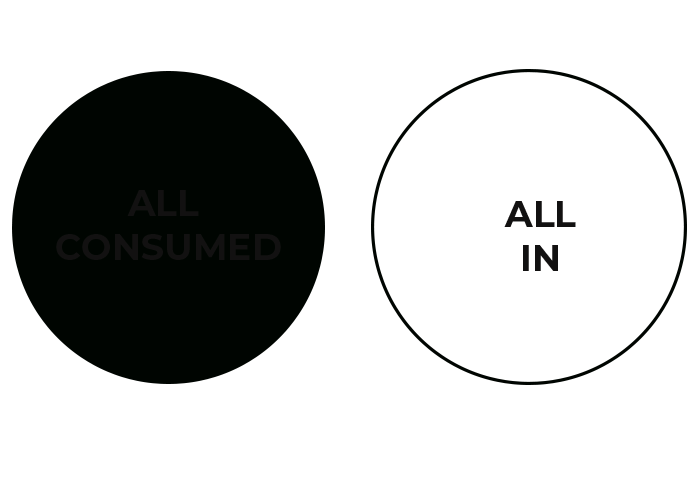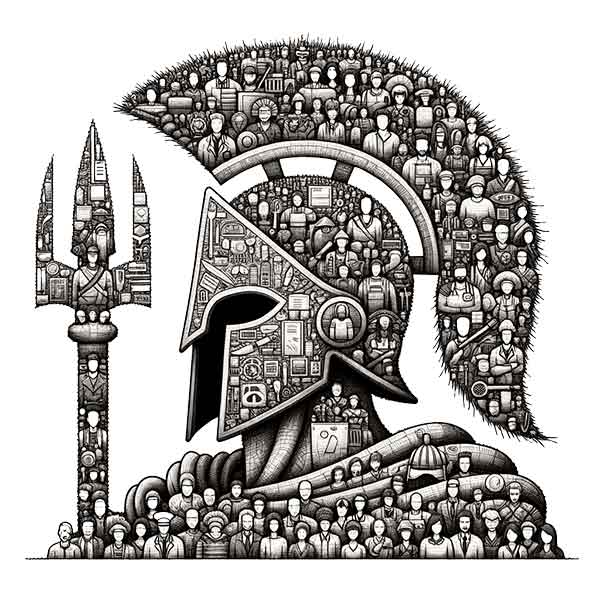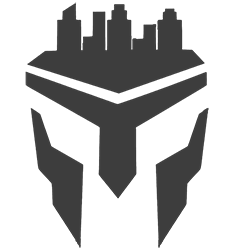In a world of relentless distractions and endless quests for instant gratification, the journey toward personal mastery can often feel like an uphill battle. This conversation between Nick Bare and Jeff Cunningham ignited something within me, prompting a moment of clarity that is perfectly aligned with the philosophy of Urban Spartan. It’s a teaching on being “all in” versus “all consumed” that we can all benefit from understanding as we strive for personal mastery in a world of ceaseless chaos.
Achieve Personal Mastery by being “All In” instead “All Consumed.”
What does it mean to be fully committed to a goal, a practice, or even a lifestyle? Jeff Cunningham beautifully breaks it down into two contrasting but closely related states: being “all in” and being “all consumed.” When you are “all consumed,” your chosen activity transforms into your very identity. This narrow focus leaves you vulnerable; without it, you find yourself adrift in a sea of confusion. Conversely, being “all in” implies that you can channel a laser-like focus into achieving your goals while keeping other parts of your life in balance. The principle here offers a sustainable approach to personal mastery, one that nourishes all aspects of your life rather than cannibalizing them.
Here is what Jeff said:
There is a huge difference between being all in and all consumed.
“All consumed” is the situation where running actually becomes your identity. And without it, you are soulless and rudderless.
Being “All in” means that you compartmentalize your energies in a way that allows you to be hyper-focused on a goal without it consuming your life to the destruction of your professional life, your relationships, and the destruction of your personal health. “All in” doesn’t necessitate the abdication of your responsibilities in the other areas of your life that are so vitally important.

But, the true wisdom of personal mastery lies in navigating the fine line between being “all in” and “all consumed.” There is one tool everyone has at their disposal, but we rarely use it: mindfulness.
Mindfulness creates a psychological distance, a breathing space between you and your actions. This “gap” allows you to fully engage in an activity without being consumed by it, thus achieving a level of personal mastery that’s both fulfilling and sustainable. It offers you the insight that you are not your actions; you are the awareness behind them.
The Fragility of Identity
Understanding that you are not your actions is just a first step. The second one is to understand your actions are not your identity.
Mindfulness helps us with both.
Understanding the fragility of identity is pivotal in the quest for personal mastery. The renowned spiritual teacher Eckhart Tolle simplifies this by describing our identities as a series of “fragile thought forms.” Once you grasp this concept, the strength of your emotional attachment to any particular role you play in life diminishes. It opens up a freedom to mold, adapt, and change your identity, enhancing your resilience and flexibility in the face of life’s inevitable changes.
In today’s world, titles and roles often box us into single identities. This obsession doesn’t just limit your personal mastery; it diminishes your human complexity. Society has built these neat little boxes around roles—be it a CEO, Professor, or Writer—and made them a playground for stereotypes. This rigidity robs us of the ability to live a fuller, more complex life.
We base our identity on our actions and the roles we play in society. We are so attached to it that many can’t handle losing it.
The Pitfalls of Attachment: Real-Life Examples
Let’s dive into some concrete examples to illustrate how the attachment to a single identity can have far-reaching consequences.
Take Alex, who’s incredibly strong and can outlift everyone in the gym. Friends admire him, often calling him a “beast,” and it becomes a core part of his self-image. But what happens when life throws a curveball—a sudden injury or illness—and Alex can’t lift weights anymore? This isn’t just a physical setback; it’s an existential crisis. Alex’s identity as the “strong guy” comes crashing down, and he is left grappling with questions about who he truly is.
Or consider those whose sense of identity is deeply entangled with their physical appearance, such as their hair. Hair loss can be devastating, not just for the aesthetic change but because of the identity crisis that often ensues. There have been tragic cases where individuals, unable to reconcile with the loss of this part of their “identity,” have taken drastic, heartbreaking measures, including ending their own lives. In these instances, identity’s fragility based on external factors becomes hauntingly clear.
Such stories are stark reminders of the dangers of tying our entire sense of self to just one aspect of our identity, underscoring the urgent need for personal mastery in understanding and managing our multifaceted selves.

The Path of the Urban Spartan: Hybrid Spirituality
In an age where being one-dimensional is often celebrated, the Urban Spartan ethos encourages a multi-faceted approach to life. Why settle for one when you can be many? This approach not only makes you more adaptable but also enables you to draw upon a variety of skills, attributes, and philosophies as you navigate through life’s complexities. This duality isn’t a mark of rebellion but a return to our most natural state.
Our ancestors were jacks of all trades out of necessity; the changing seasons, diverse terrains, and the challenges of day-to-day survival required a wide range of skills. You couldn’t just be a hunter or a gatherer; you needed to know how to build shelter, administer first aid, and perhaps play a musical instrument around the campfire.
Then came the Industrial Revolution, a seismic shift that redefined the human experience in profound ways. This era brought with it the notion of specialized labor and compartmentalized roles. Suddenly, we were cogs in a much larger machine, each responsible for a single, specific task. While this had its advantages—efficiency, expertise, a booming economy—it also narrowed our identities. We became increasingly defined by our jobs and less by the rich tapestry of skills and interests that make us uniquely human.
So, why is this relevant today?
Because this shift towards specialization has trickled down into our personal lives, often limiting how we see ourselves and confining our identities into neatly labeled boxes.
Conclusion: Master of None, Master of Self
So, let’s break free from the shackles of single identities and embrace the complexity that comes with being human. Remember, personal mastery isn’t about perfection; it’s about progress and evolution. It’s about being agile, adaptable, and aware enough to move between roles, responsibilities, and philosophies without losing your core self. And that, my friends, is what it means to be an Urban Spartan.

